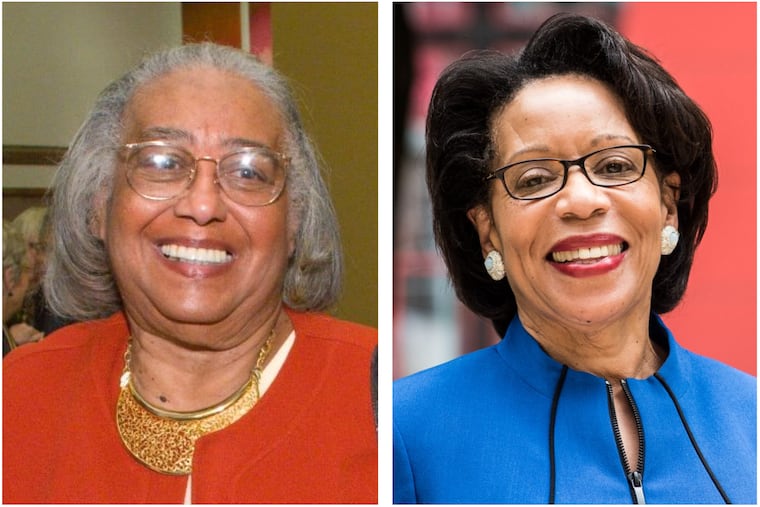With the deaths of Clayton and Epps, Philadelphia mourns two icons of education | Editorial
As leaders, Constance Clayton and JoAnne A. Epps brought selflessness, dedication, and a drive to make our city a better, more equitable place.

Philadelphia lost two trailblazing giants in the field of education this week in former School District Superintendent Constance Clayton and Temple University acting president JoAnne A. Epps. Their passing is a reminder of what is often lacking in today’s leaders: selfless dedication to doing what is right for the greater good.
Clayton, who died on Monday at age 89, was the first Black and first female school chief in Philadelphia history. She was a fierce advocate for students, especially the disadvantaged Black students who made up most of the School District. She was decades ahead of her time in making the case for equitable funding in education, a fight that continues today.
A product of Philadelphia’s education system — graduating from Girls’ High, Temple University, and the University of Pennsylvania — Clayton began as a fourth-grade teacher in North Philadelphia and worked her way up through the ranks before eventually overseeing the fifth-largest school system in the country.
At a time when school superintendents come and go every few years like major league baseball managers, Clayton presided during three mayoral administrations, from 1982 to 1993. The men in the room knew she was not to be trifled with.
Clayton broke barriers when few African American women had seats at tables of power. Her passing comes as Philadelphia is likely to soon elect its first Black female mayor. The arc of Clayton’s life in education is perhaps even more profound given that she graduated from a segregated elementary school in the city.
She was also ahead of her time in standardizing curriculum and ensuring Black history was taught, something many Republican elected officials and school boards around the country today are trying to stamp out or rewrite. Clayton knew everyone must learn the same set of facts so as not to repeat past abominations. She was devoted to art and stressed the importance of voting — a lesson that needs reteaching as turnout plummets in the city.
Clayton also brought fiscal sanity to the School District, balancing budgets without cutting programs while test scores increased. Throughout those adult battles, she remained laser-focused on students and deployed many skills lacking in leaders today.
She was tough but fair. Demanding, yet charming. She listened but didn’t suffer fools. She also empowered those around her and encouraged teachers to treat students as if they were their own children.
JoAnne A. Epps possessed many of the same leadership skills and dedication to education and Philadelphia. Epps, 72, spent nearly four decades at Temple University before her death Tuesday after collapsing on stage during a university event.
A graduate of Yale Law School, Epps worked as a federal prosecutor before joining the faculty at Temple’s Beasley School of Law. She served as dean of the law school from 2008 to 2016. Her legal acumen was such that former President Barack Obama considered her for an appointment to the U.S. Supreme Court.
Epps became Temple’s provost but was nudged aside in 2021 shortly after Jason Wingard became president. When Wingard’s brief and rocky tenure ended in March after a series of miscues, Temple leaders quickly turned to Epps to right the ship. She selflessly agreed to serve as interim president — the first Black woman to do so — and not be a candidate for the permanent post.
Her death is yet another setback for Temple, which has suffered a series of seismic events that have roiled the campus, including a student worker strike, declining enrollment, and the shooting deaths of a student and university police officer. Epps made increasing enrollment and public safety her top priorities this year, which her successor must maintain with the same focus and grace.
The university recently launched a search for a new president, which is expected to take close to a year to complete. Temple is an important institution in the city. Beyond being the main economic engine in North Philadelphia, the university educates many first-generation students.
Finding a dynamic leader who can restore Temple’s glory would be the best way to honor Epps.
Finding a dynamic leader who can restore Temple’s glory would be the best way to honor Epps, who had a profound and lasting impact on many students, faculty, and staff.
Reginald Streater, a trial lawyer and president of Philadelphia’s school board, experienced homelessness as a child and worked as a bartender. He went to Temple’s law school because of Epps and recalled her telling first-year law students, “Your job is to make the world a better place.”
Epps and Clayton certainly did that. Losing these two education leaders and devoted Philadelphians leaves a major void. But their legacies live on.